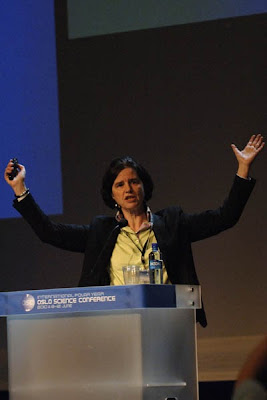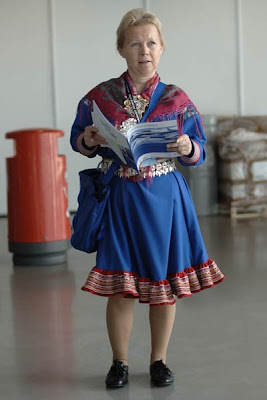
This familiar face is Chuck Strahl, Canada's federal Minister of Indian and Northern Affairs and Economic Development. Strahl thanked scientists for their work in the Canadian arctic. He also welcomed all delegates to the final IPY conference in Montreal in 2012.
Strahl said, "We now have more knowledge about the polar atmosphere, oceans, ice, land and people. We also know more about tundra permafrost, freshwater systems, vegetation and animal populations.
 "Canada is proud to have actively participated in IPY. We were one of the largest contributors...We sponsored specific projects that captured the collaborative spirit. For example, the Circumpolar Flaw Lead System study that involved more than 600 researchers, northerners, journalists and artists from 27 different countries.
"Canada is proud to have actively participated in IPY. We were one of the largest contributors...We sponsored specific projects that captured the collaborative spirit. For example, the Circumpolar Flaw Lead System study that involved more than 600 researchers, northerners, journalists and artists from 27 different countries.



"And of course (melting sea ice) has resource implications, which can have global implications in terms of going after more oil. Here I think we should just respect for a moment what is happening in the Gulf of Mexico in the US and thank goodness that accident (oil spill) did not happen in a polar region where the water is cold and it will take microbial activity much longer to break the oil down."
Strahl said, "We now have more knowledge about the polar atmosphere, oceans, ice, land and people. We also know more about tundra permafrost, freshwater systems, vegetation and animal populations.
 "Canada is proud to have actively participated in IPY. We were one of the largest contributors...We sponsored specific projects that captured the collaborative spirit. For example, the Circumpolar Flaw Lead System study that involved more than 600 researchers, northerners, journalists and artists from 27 different countries.
"Canada is proud to have actively participated in IPY. We were one of the largest contributors...We sponsored specific projects that captured the collaborative spirit. For example, the Circumpolar Flaw Lead System study that involved more than 600 researchers, northerners, journalists and artists from 27 different countries.IPY was an exceptional undertaking. It inspired practical, policy, relevant research. It has promoted international collaboration and partnerships at a level we've not seen before. It has encouraged the development of new researchers. As we move from knowledge to action, I call on everyone here to continue to work together on these vital endeavours, not only for the benefit of our own nations, but for all of humanity.
"Thank you very much for all your work. Two years from now, many of us here will gather in Montreal for the [final] IPY Conference 'From Knowledge to Action'. I hope to see you there."

Dr. Katherine Richardson focused on oceans and sea ice. Richardson is a professor of biological oceanography at the University of Copenhagen. She is a dynamic, engaging speaker with great hand gestures. This is a portion of her talk on melting Arctic sea ice.

"It has global implications in terms of shipping and safety. There are a lot of military people who are really, really worried about all those tourists coming into Arctic regions and what happens if there is an accident up there. We really don't have the facilities at the moment to do very efficient search and rescue in that part of the world.

"And of course (melting sea ice) has resource implications, which can have global implications in terms of going after more oil. Here I think we should just respect for a moment what is happening in the Gulf of Mexico in the US and thank goodness that accident (oil spill) did not happen in a polar region where the water is cold and it will take microbial activity much longer to break the oil down."
Inger Anne Siri Triumf deciding where to go next.


No comments:
Post a Comment